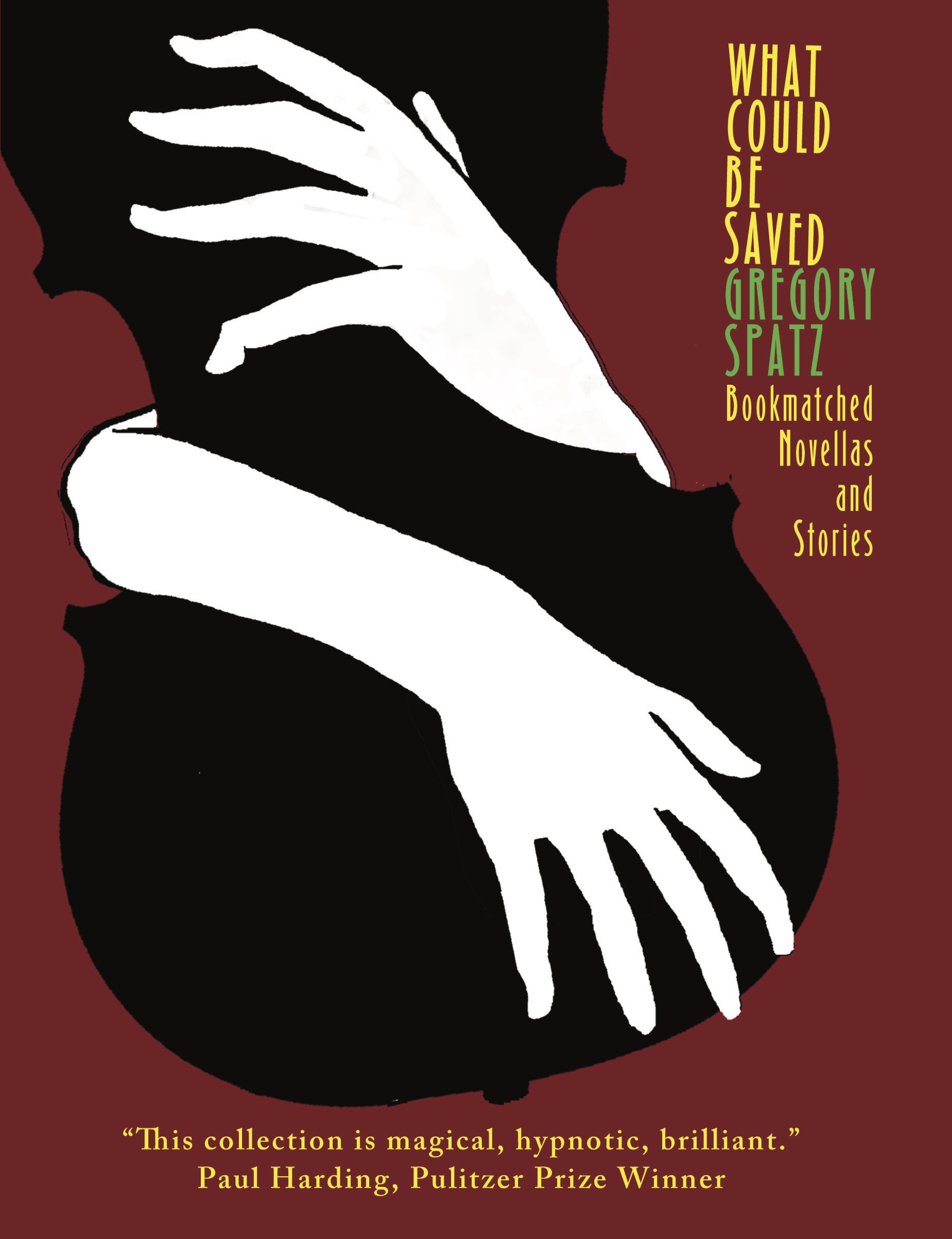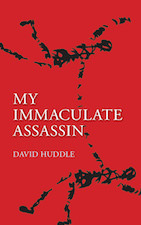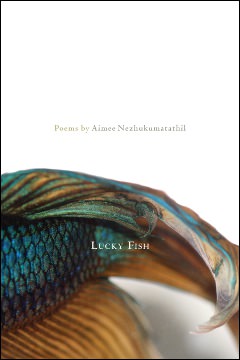What Could Be Saved: Bookmatched Novellas & Stories
by Gregory Spatz
$19.95
“This collection is magical, hypnotic, brilliant.” — Paul Harding, Pulitzer Prize winning author of Tinkers.
Going where most readers have never been — past the workshop door, behind the curtain to the hidden rehearsal space, and into the back room of a pawn shop or dealer’s office, Gregory Spatz’s new book delves deeply into the world of those who build, play, and sell (or steal) violins. This is a realm of obsession, of high-stakes sales and thefts, and of rapturous but also desperate performance escapades. Dense with detail, and peopled with a fabulously particular (yes, eccentric) ensemble cast, the linked pieces in What Could Be Saved—two of novella length, and two stories—have the intense force and beauty of chamber music.
Published: June 1, 2019
Format: Paperback
 “As a child, he begged his parents for violin lessons, and many of his passages have a kind of legato feel to them—a style of playing that connects notes smoothly together, without silence in-between, while still allowing each note to be articulated.” -Wendy J. Fox, The Rumpus
“As a child, he begged his parents for violin lessons, and many of his passages have a kind of legato feel to them—a style of playing that connects notes smoothly together, without silence in-between, while still allowing each note to be articulated.” -Wendy J. Fox, The Rumpus
“I found it refreshing to read such spot-on stories all packaged in a wonderful symphony of perfectly laced words… It’s a winner!” —Fiddler Magazine
“Spatz’s writing—like the best songwriting—is both familiar and surprising. The worlds he creates are true. They have heft and balance, but each is unique and strange enough to keep you holding it in your hands, turning the pages over in sheer pleasure… Highly recommended.” — Bluegrass Unlimited
“One might have thought the idea of building a compelling love story around the highly specialised and rarefied world of violin making virtually impossible, yet such is Gregory Spatz’s exceptional skill with narrative flow and emotional detailing that What Could Be Saved – the first and longest in this collection of four stories, all based around the violin – compels the reader onwards.” —Julian Haylock, The Strad
“What Could Be Saved is for readers who love being immersed in the minutiae of a world they would not otherwise enter.” — Martha Anne Toll, NPR
Read the full NPR Book Review here.
“There is a beauty and a grace behind the writing that pulls you under and sweeps you away on a whirlwind of emotion as you read about something as innocuous as a violin. You are captivated by the style and entrapped by the stories as you piece together the elements that tie everything together beyond the presence of violin in each.” – Amanda Rogers, Call Me [Brackets]
Featured in Self magazine among “Short but impactful books for busy people.”
“What Could Be Saved initiates the reader into the mysteries of a secret society of artists and artisans, thieves and treasure hunters, forgers and true believers, all of whom idolize the nearly supernatural powers and traditions of the violin. Those old, priceless instruments are like keys that unlock the quintessence of music and beauty, but they are also ‘the devil’s box,’ just as often counterfeits that sow delusion and disenchantment as they pass from acolyte to acolyte – player to player, luthier to luthier – through the centuries. Gregory Spatz has conjoined these stories into a masterly quartet that casts the same spell on the reader as on its characters. This collection is magical, hypnotic, brilliant.” — Paul Harding, musician and author of Pulitzer Prize winning Tinkers
“If good fiction is a bringing of the news from one world to another, then Gregory Spatz, with this radiant book, is bringing us news of the violin, giving voice to its makers, its players, and even the instrument itself. What a rare gift it is to be immersed in this world and emerge from it changed, with not only a richer understanding of music and those who make it, but a whole new way of listening.” — Sarah Shun-lien Bynum, author of Madeleine is Sleeping and Ms. Hempel Chronicles
“Intricate and formally daring, Gregory Spatz’s What Could Be Saved unshrouds the secret lives of high-end violins and their dedicated and impassioned makers. With their loves, losses, and obsessions spanning generations, we can’t help but root for these perfectionists in an imperfect world. Like the venerable instrument at the center of these linked tales, Spatz’s prose produces a beautiful tone.” —Leland Cheuk, author of The Misadventures of Sulliver Pong
“A subtle, fascinating collection of exquisite and painstaking attention about, in many respects, exquisite and painstaking attention. I love how the story of each violin made or restored here, each relationship cultivated or lie told, is so beautifully, elegantly dense with the projections of the people implicated. I love too that Gregory Spatz reveals most of these people to be unexpectedly good and interesting, without becoming sentimental, and without sacrificing acknowledgment of a full spectrum of human behavior. In Gregory Spatz’s What Could Be Saved, the violin—in the most unexpected landscape for so old and storied an instrument—is a magnificent container for and mirror of the best and worst of humanity; is a vehicle for our greatest capacities for the eternal verities, and a currency of deception and evil. This book is a new favorite.” — Bonnie Nadzam, author of Lamb and Lions
“The novellas and stories of Gregory Spatz’s What Could Be Saved teem with notes of human discord and connectivity, a constant surge of dissonance and melody, crushing a concert in your head of subtle, tortured character, of lyrical language languishing in the ear, of sadness and triumph wringing your heart. This tightly woven series of connected tales reminds us of what good literary writing is for, and why it will never fade out of tune.” —Jamie Iredell, author of The Fat Kid
“What Could Be Saved is a vivid, engrossing portrait of luthiers and musicians, of fathers and sons, and of family lore fueling life-long obsessions. Gregory Spatz has written a love letter to both violins and to the artists and craftsmen whose lives, however briefly, intersect with them. Above all, these perfectly tuned stories convey the pathos of inheritance: the difference between what we think we’re leaving behind, and what’s actually left.” —Alexis Smith, author of Glaciers and Marrow Island
“Gregory Spatz’s new book is entrancing, a truly original work unlike anything else I can think of. It succeeds on so many different levels: as fiction, as musicology, as a primer on the art of violin-building. The prose in these pages simply dazzles. What a special writer Spatz has become.” —Steve Yarbrough, author of eleven books, most recently the novel The Unmade World.
“Gregory Spatz has an extraordinary ability to get at what lies beneath the surface and put words to the ineffable—music, yes (even his violins speak!), but also the undercurrents of emotions, unconscious urges and inchoate longings that form and deform our lives. What Could Be Saved is as fiercely seeing as it is ultimately generous in its gentle vision of human frailty and the desire to connect.” —Elizabeth Graver, author of The End of the Point.
At the heart of What Could Be Saved is the culture of the violin world—its beauty, myth-making, magic, romance and deceit, as well as its history and ethos of perfection at any cost. In stories and novellas matched end-to-end like the twinned or “bookmatched” pieces of tonewood that separately comprise a violin, What Could Be Saved winds its way through the hopes and dreams of builders, dealers and players caught up in the violin trade, a trade that is so unlike any other in the world.
From the story of a young man who refuses to follow in his father’s footsteps as a violin builder, to the magical realism of the story told in the point of view of forgotten, abused and ordinary violins, What Could Be Saved transports you into the world of the violin, compelling you to witness its most tragic, comic and thoroughly human dramas.
Blending viewpoints and storytelling techniques, including magical and psychological realism, moving from novella to story and back again, there is a sustained musicality that thrums through these beautiful, almost dream-like tales. Spatz’s language is precise and powerful, his fiction elegantly wrought. A book that echoes long after its music ends.
Additional information
| Weight | 0.4 lbs |
|---|
Click here to download the free lesson plan for What Could Be Saved.







